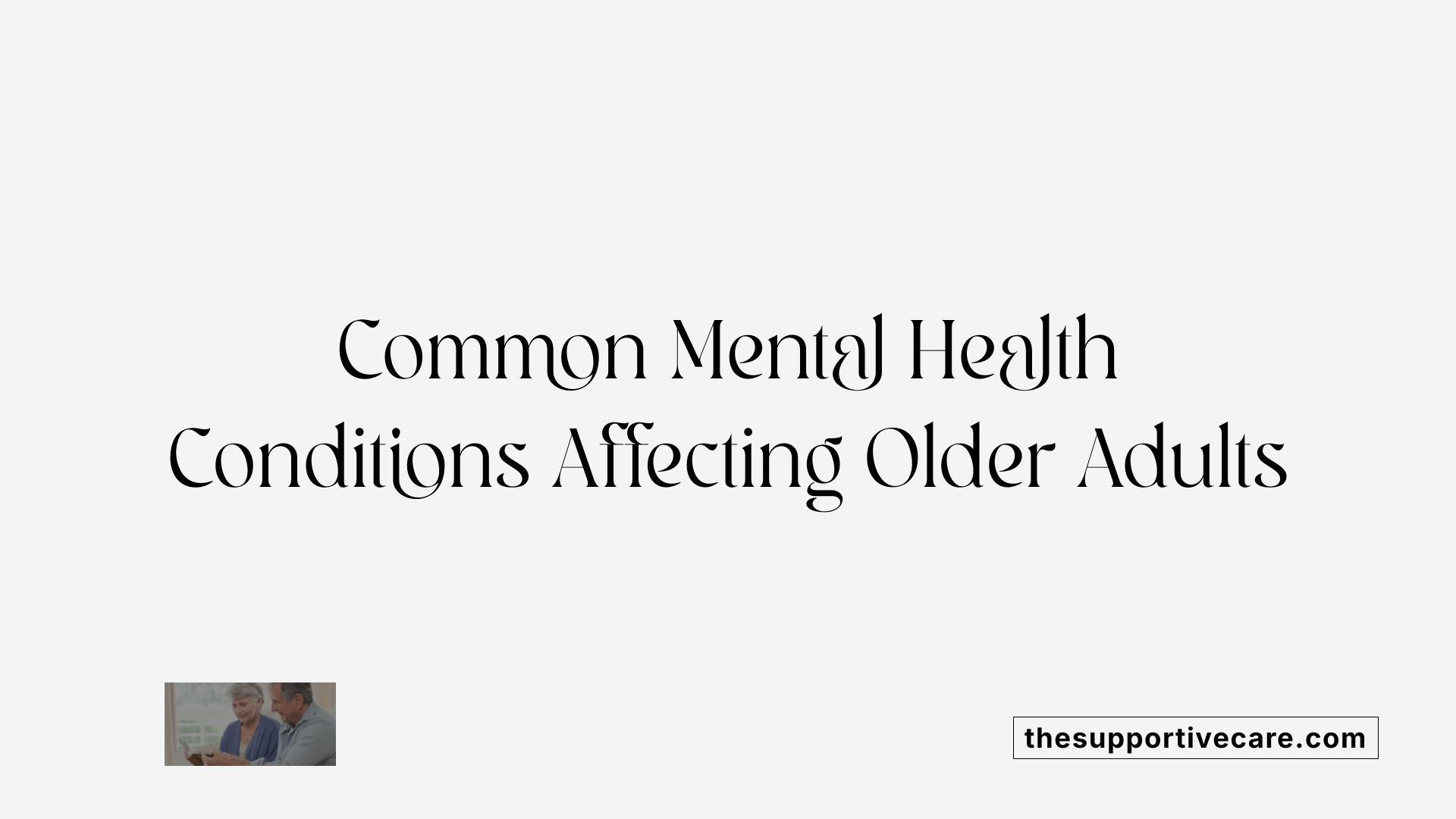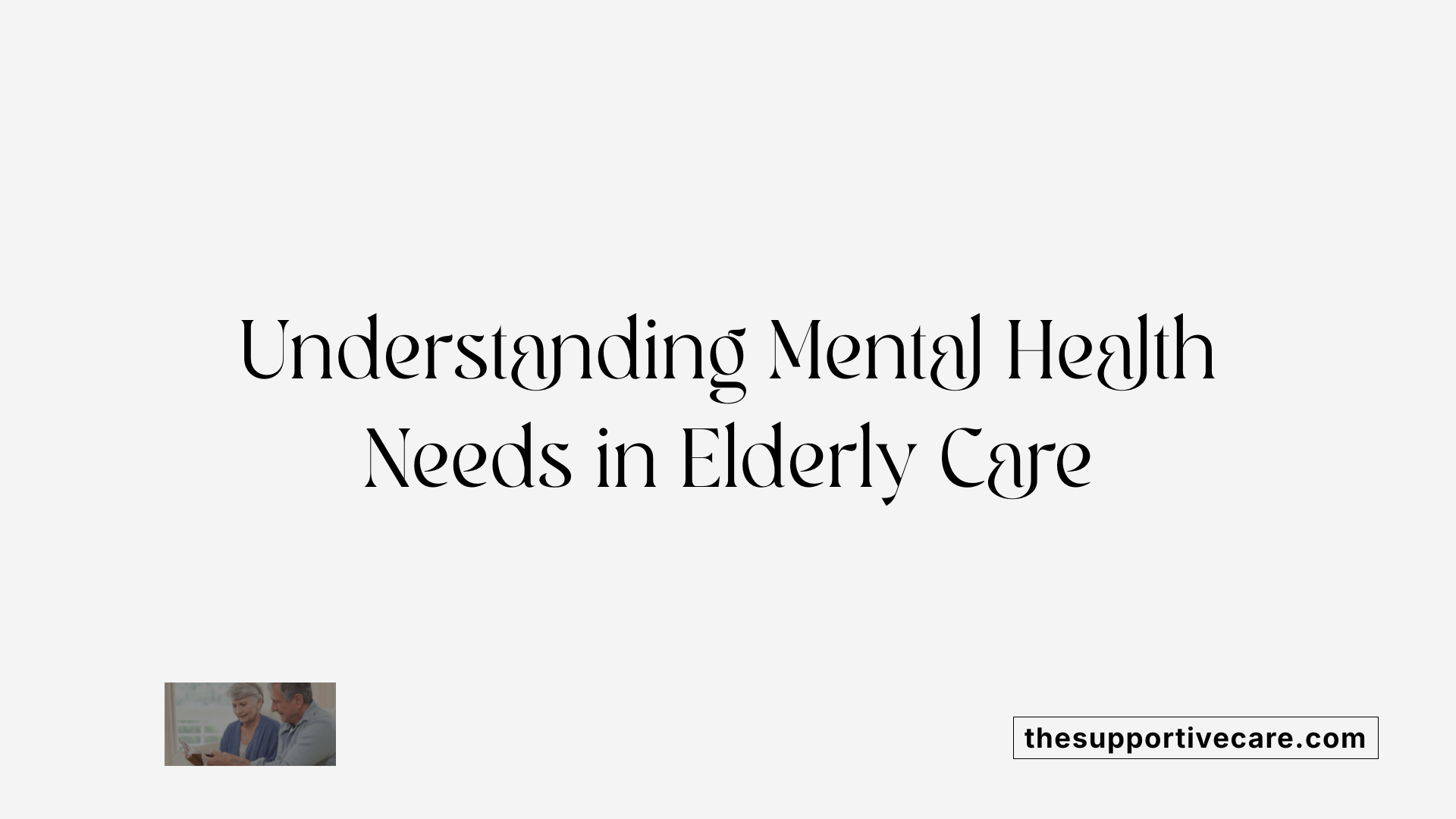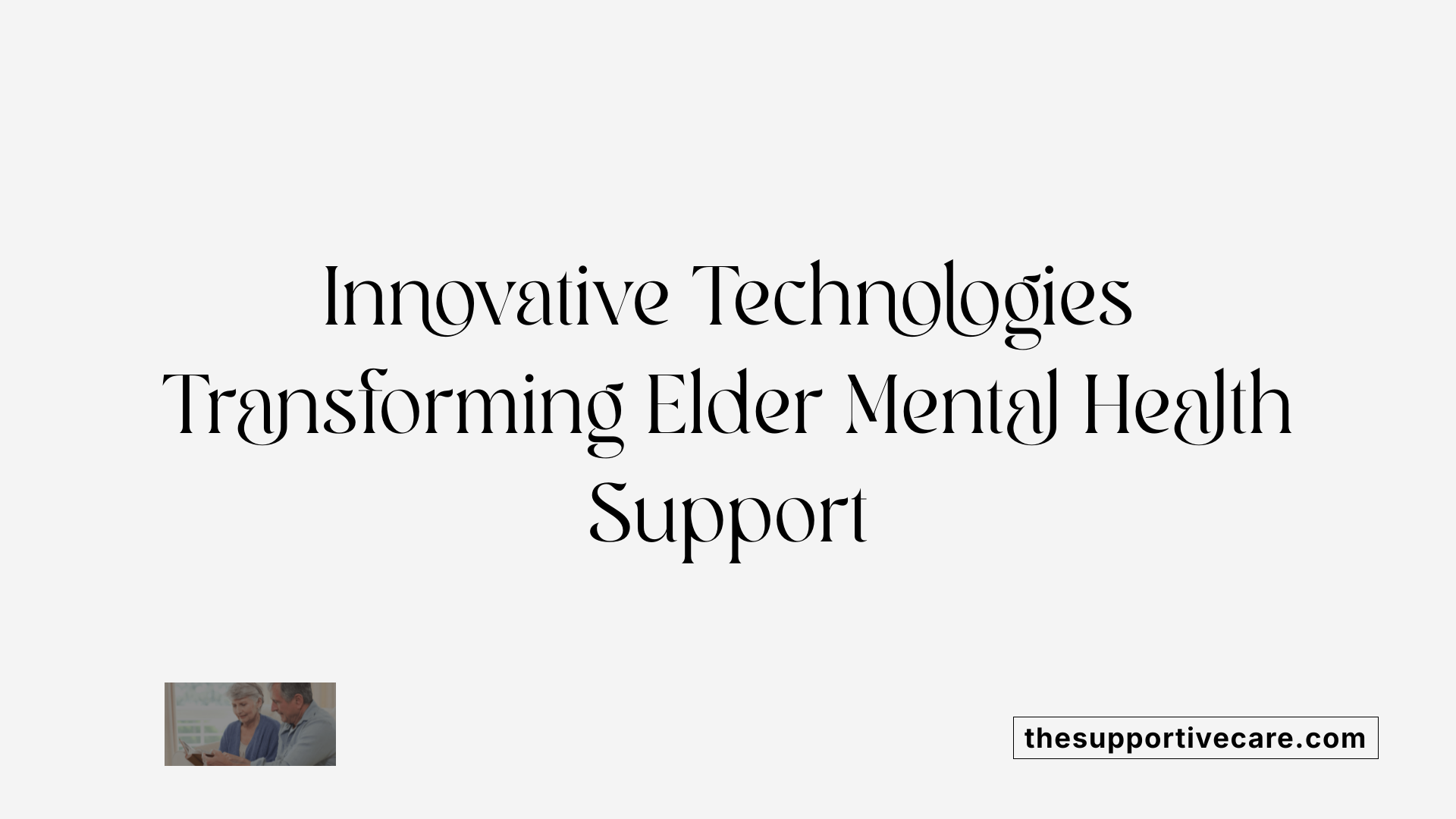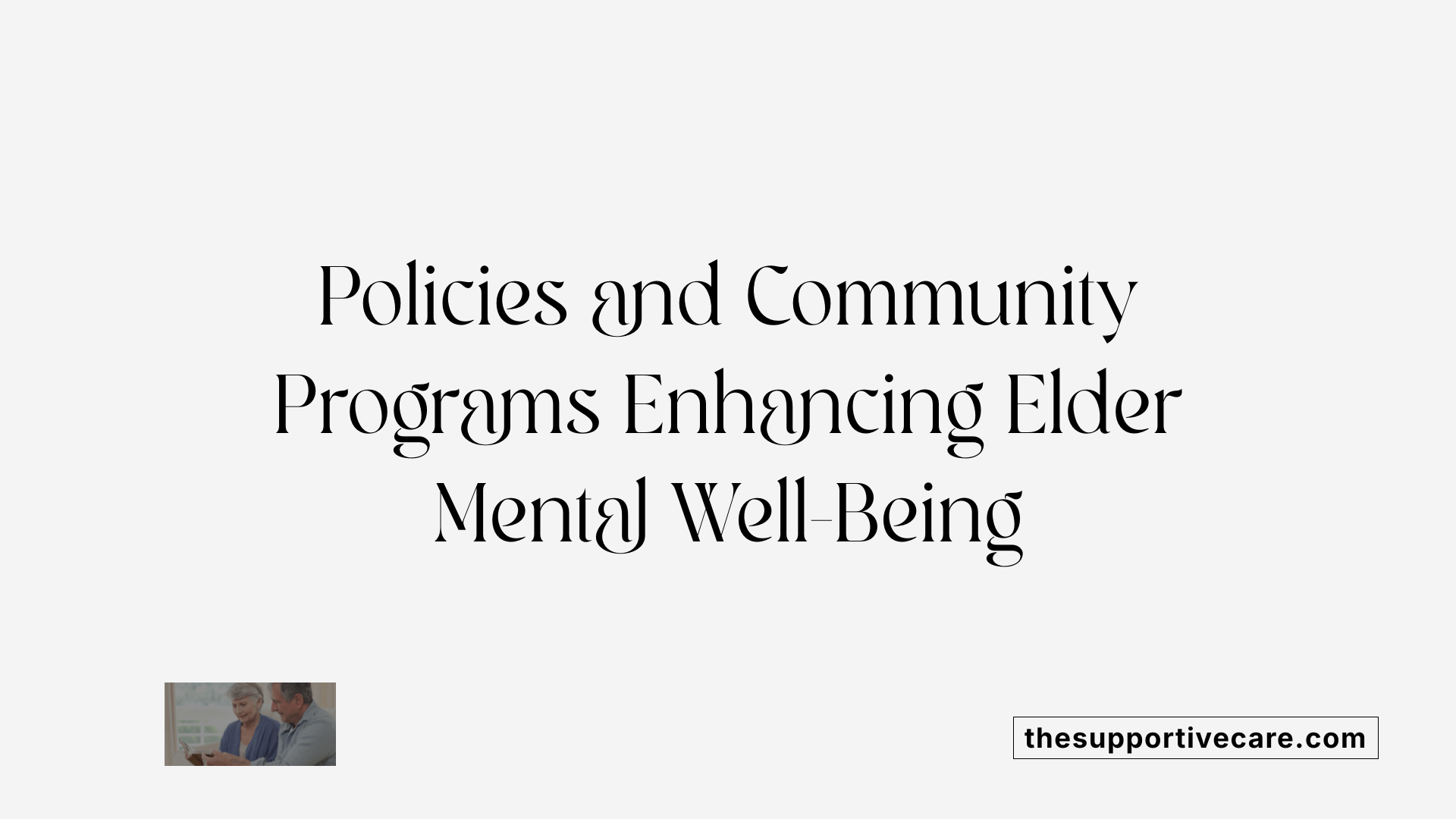Transforming Elder Medical Care Through Mental Health Integration
As the global population ages, integrating mental health into routine elder medical care has become crucial to improving outcomes, enhancing quality of life, and reducing healthcare costs. This article explores the current landscape, best practices, innovative models, barriers, and policy frameworks that support a holistic approach to mental health for older adults, emphasizing person-centered, multidisciplinary, and community-based strategies.
Prevalence and Types of Mental Health Issues in Older Adults

What are the most common mental health problems in older adults?
The most frequently encountered mental health issues among older adults include depression, dementia, anxiety disorders, and substance use problems.
Depression stands out as the most prevalent mental health disorder in this age group, affecting approximately 15% of those over 65. It can cause profound distress, impair daily functioning, and is often missed or undertreated due to misattribution to normal aging processes. Dementia, particularly Alzheimer’s disease, affects millions globally and leads to progressive cognitive decline, behavioral changes, and increased mortality risk. Early diagnosis of dementia is vital to plan appropriate care and interventions.
Anxiety disorders and post-traumatic stress disorder are also common but less often recognized, contributing to heightened distress and isolation. Substance misuse, including alcohol and prescription medication abuse, impacts a significant portion of the elderly—about 8-10%—and can exacerbate other health issues.
Elder abuse, which encompasses physical, verbal, psychological, sexual, or financial harm, affects roughly one in six seniors and often results in secondary mental health issues such as depression and anxiety. These conditions underscore the importance of tailored mental health services that address both clinical symptoms and psychosocial factors affecting older adults.
Why is mental health important in the elderly?
Mental health plays a pivotal role in the overall well-being of older adults by influencing their emotions, thinking, behavior, and ability to adapt to various life changes.
Maintaining good mental health helps seniors better cope with stressors like bereavement, loss of independence, and retirement, which are common in late life. It supports social engagement, decision-making, and resilience, contributing to a more fulfilling, active life.
Moreover, mental health significantly affects physical health outcomes. Untreated depression and anxiety can worsen chronic illnesses such as heart disease, diabetes, and respiratory conditions. Conversely, managing mental health effectively can improve adherence to treatments and reduce hospitalizations.
Addressing mental health concerns also prevents the progression of distress into more severe conditions and reduces the risk of premature mortality. Given that mental disorders are not a normal part of aging but are treatable, prioritizing mental health care for older populations is essential for promoting healthy aging and enhancing quality of life.
Impact of mental health problems on physical health, quality of life, and mortality
Mental health issues in older adults are linked to increased morbidity, reduced physical functioning, and higher mortality rates.
Depression correlates with poorer management of physical illnesses, increased risk of cardiovascular events, and decreased longevity. Anxiety, often associated with chronic health conditions, can intensify physical symptoms and impair recovery.
Poor mental health diminishes overall life satisfaction, increases social isolation, and leads to functional decline, making it harder for seniors to perform daily activities. Furthermore, mental health disorders are associated with increased healthcare utilization, including hospitalizations and emergency visits, stressing the healthcare system financially.
Untreated mental health problems often lead to a vicious cycle where physical health worsens, and mental distress further diminishes physical capabilities, lowering overall quality of life and increasing the risk of death.
Underdiagnosis and undertreatment challenges
Despite the high prevalence, mental health conditions among older adults frequently remain underdiagnosed and undertreated.
Several factors contribute to this gap, including symptoms being dismissed as normal aging, stigma surrounding mental illness, and limited screening in primary care settings. Healthcare providers may lack specialized training in geriatric mental health, leading to missed or delayed diagnoses.
Care systems often treat mental health as secondary, resulting in fragmented services. Older adults may also resist seeking help due to fear of stigma, shame, or transportation barriers.
This underrecognition results in untreated conditions that can severely impair functioning, increase the risk of fall-related injuries, worsen physical health, and elevate mortality rates. Addressing these challenges requires integrating mental health screening into routine care, increasing provider education, and reducing societal stigma.
Summarizing the mental health landscape in aging populations
The overlap of physical, social, and psychological issues makes mental health in older adults a complex but critical area of focus.
Effective strategies include routine screening tools like PHQ-9 for depression, GAD-7 for anxiety, and cognitive assessments like MMSE or MoCA for dementia, administered during primary care visits.
Addressing social determinants—such as loneliness, social isolation, and elder abuse—is fundamental in prevention and management. Community-based programs, social engagement activities, and supportive services significantly contribute to better mental health outcomes.
Promoting awareness, destigmatizing mental health care, and ensuring access to integrated, culturally competent services are essential to close the gap between need and care.
Innovations like telehealth, mobile health apps, and peer support programs also demonstrate promise in expanding mental health support for older adults, especially those in underserved or rural areas.
Enhancing provider training and expanding interdisciplinary teams will foster comprehensive, person-centered care that treats mental health as a vital component of aging well.
| Aspect | Observation | Additional Details |
|---|---|---|
| Common Conditions | Depression, dementia, anxiety, substance use | Affect millions globally; early detection critical |
| Impact | Reduced quality of life, increased mortality | Worsen physical health, increase hospitalizations |
| Underdiagnosis | Symptoms dismissed, stigma prevalent | Requires routine screening, education |
| Treatment | Pharmacotherapy, psychotherapy, social support | Tailored to individual cultural and health needs |
| Prevention | Combating loneliness, elder abuse, promoting social engagement | Community programs and supportive policies |
By recognizing and addressing mental health conditions early and systematically, health systems can significantly improve the longevity and quality of life for older adults, fostering healthier aging populations.
Understanding the Mental Health Landscape in Eldercare

What are the most common mental health problems in older adults?
The most prevalent mental health issues among older adults include depression and dementia. Depression, affecting up to 15% of those over 65, can cause significant distress, impair daily functioning, and often remains underdiagnosed and undertreated. Dementia, notably Alzheimer’s disease, impacts millions worldwide, leading to cognitive decline, behavioral changes, and increased mortality risk. Early detection of dementia is vital to manage symptoms and improve quality of life. In addition to these, anxiety disorders are common, especially social anxiety and generalized anxiety. Post-traumatic stress disorder (PTSD), often linked to earlier trauma, can persist into old age. Substance abuse issues, including alcohol and prescription medication misuse, are also noteworthy but frequently underrecognized. Elder abuse, whether physical, emotional, psychological, or financial, can result in severe psychological effects such as depression and anxiety, emphasizing the need for vigilant screening and tailored interventions. Overall, understanding these common mental health problems enables healthcare providers to deliver more effective, personalized care to aging populations.
Models of Integrated Care for Elderly Mental Health
What are the best practices and frameworks for mental health integration in elder care?
Effective mental health integration for older adults involves assembling multidisciplinary, community-based teams dedicated to comprehensive, person-centered care. These teams typically include primary care providers, mental health professionals, social workers, and caregivers who work collaboratively to address the physical, social, and emotional needs of aging individuals. Standardized screening tools such as PHQ-9 for depression, GAD-7 for anxiety, and cognitive assessments like MMSE and MoCA help in early detection and ongoing monitoring.
Personalized treatment plans that combine psychosocial interventions, behavioral therapies, and medical management are essential. The use of digital health technologies, including telehealth, mobile applications, and remote monitoring devices, greatly expands access and convenience, especially for those with mobility issues or in remote locations. Frameworks like WHO's Decade of Healthy Ageing and guidelines from the mhGAP program support these efforts by promoting policy development, training, and care standardization.
Advances in biomarkers and remote diagnostics enhance early detection of mental health conditions, while caregiver involvement ensures sustained support. The inclusion of community resources and focus on social determinants such as stigma, loneliness, and social isolation further strengthen the holistic approach. These integrated models foster resilience and aim to improve mental health outcomes by emphasizing individualized care, coordination, and the utilization of technology to bridge gaps in services.
What strategies can improve access to mental health care for older adults?
Improving access requires comprehensive, strategic efforts that address both systemic barriers and individual needs. Establishing multidisciplinary team care models ensures that mental health is integrated into general health services, making treatment more accessible and less stigmatized. Embedding mental health professionals within primary care and community clinics creates familiar, stigma-free environments for older adults.
The expansion of telehealth services, such as telepsychiatry and digital interventions, is crucial, especially in rural or underserved areas. User-friendly digital tools like smartphone apps and voice assistants can support ongoing engagement and self-management. Policy initiatives should focus on increasing insurance coverage for mental health treatments, streamlining reimbursement processes, and providing incentives for provider participation.
Addressing social determinants—like loneliness, social isolation, and ageism—through community outreach programs and social support initiatives boosts both mental health and access. Public education campaigns help reduce stigma and encourage help-seeking behaviors. Collectively, these approaches ensure that older adults receive timely, appropriate care that respects their preferences and cultural backgrounds, ultimately leading to better mental health outcomes.
Effective Networks and Community Resources in Elder Mental Health
How do community mental health teams support assessment and treatment of mental health in older adults?
Community mental health teams (CMHTs), including specialized Older People’s Mental Health (OPMH) teams, play a vital role in supporting the assessment and treatment of mental health issues among older adults. These teams conduct comprehensive evaluations to diagnose conditions like depression, anxiety, dementia, and psychosis. They provide ongoing management through outpatient clinics, home visits, and community-based services, ensuring care is personalized.
CMHTs operate via referral pathways such as electronic Referral Service (eRS) systems, enabling timely access to services. They coordinate care across various settings, including primary care, hospitals, and social services, fostering a integrated model that meets the complex needs of aging populations. Supportive services like dementia advice, talking therapies such as iTalk, and caregiver support are also part of their offerings.
By working collaboratively with general practitioners, social workers, and specialists, CMHTs enhance continuity and accessibility of mental health care. Their person-centered approach addresses multimorbidity and frailty, aiming to improve outcomes and quality of life for older adults within the community.
What are the best practices and frameworks for mental health integration in elder care?
Effective elder mental health care relies on multidisciplinary, community-based teams that offer coordinated assessment and treatment. Implementing evidence-based frameworks like the World Health Organization’s Decade of Healthy Ageing provides strategic guidance for promoting mental wellness.
Utilizing early detection tools and personalized treatment plans, particularly for dementia and depression, improves intervention effectiveness. Digital tools like telehealth expand access, allowing remote assessment and therapy, especially useful during times of mobility restrictions or in rural areas.
Incorporating psychosocial interventions that address social support, loneliness, and stigma is crucial to holistic care. Addressing social determinants of health, such as housing and caregiver support, is equally important.
Standardized guidelines like WHO’s Mental Health Gap Action Programme (mhGAP) ensure quality care delivery. Advances in biomarkers, remote monitoring, and caregiver involvement further support resilient, person-centered models. Combining these strategies fosters comprehensive care systems that improve mental health outcomes among older populations.
What strategies can improve access to mental health care for older adults?
Improving access involves creating flexible, integrated care models that meet diverse needs. Expanding multidisciplinary team approaches allows mental health services to be embedded within primary care settings, making them more accessible and less stigmatizing.
Technological innovations such as telepsychiatry, mobile apps, and voice-activated devices can help reach isolated or mobility-limited seniors. These tools facilitate screening, counseling, and medication management from home.
Addressing social barriers, including ageism, loneliness, and social isolation, enhances engagement with mental health services. Community outreach programs, peer support groups, and public education campaigns can normalize seeking help and reduce stigma.
Policy initiatives must aim to increase workforce capacity by training more geriatric mental health specialists and integrating mental health care into existing primary care infrastructure. Ensuring insurance coverage and reimbursement for mental health services also reduces financial barriers.
By prioritizing these strategies, healthcare systems can bridge gaps, ensuring older adults receive timely, effective mental health support, ultimately improving their quality of life.
| Aspect | Approach | Additional Details |
|---|---|---|
| Service Integration | Embed mental health within primary and community care | Using team-based models like collaborative care and behavioral health homes |
| Technology Use | Expand telehealth and digital interventions | Telepsychiatry, apps, voice assistants for screening and therapy |
| Social Barriers | Address loneliness, stigma, and social determinants | Outreach, peer support, education, community engagement |
| Workforce Development | Increase specialized training and capacity | Training of providers in geriatric mental health, caregiver support |
| Policy & Funding | Improve reimbursement and coverage | Incentives for integrated services, policy reforms |
This comprehensive approach, combining community team support, innovative frameworks, and targeted strategies, aims to optimize mental health care delivery for the aging population.
Addressing Systemic Barriers and Enhancing Policy Frameworks
What are the policy guidelines for mental health integration into elder healthcare?
Policy guidelines aimed at integrating mental health into elder care emphasize a holistic, team-based approach that combines social, physical, and mental health services. Successful frameworks advocate for the widespread adoption of collaborative care models, which include measurement-based practices that monitor patient progress and adapt treatments accordingly.
Addressing social determinants such as loneliness, social isolation, and stigma is crucial. Policies should promote community engagement, resilience, and family involvement to foster supportive environments that bolster mental health.
Embracing technological advancements, including telepsychiatry, digital health tools, and voice-activated systems, can enhance access and engagement for older adults. Training healthcare providers in geriatrics and mental health competencies is equally essential to ensure high-quality care.
Early detection is a core component, with policies encouraging the use of screening and diagnostic innovations like biomarkers and neurocognitive assessments. Personalized treatment plans tailored to individual needs and cultural contexts are fundamental.
Systemic barriers such as healthcare provider shortages, insurance limitations, and disparities in care access must be addressed through expanded workforce initiatives, improved insurance coverage, and integrated care networks. These measures aim to make mental health services accessible, equitable, and effective for the aging population.
How do policy initiatives currently support mental health care for seniors?
Existing policy initiatives have made significant strides in supporting mental health services for older adults. Medicare has implemented new payment codes that incentivize integrated behavioral health services within primary care, fostering collaboration between general practitioners and mental health professionals.
Partnerships with private insurers and Medicaid programs have increased reimbursement options for evidence-based treatments like cognitive behavioral therapy (CBT) and medication-assisted therapy (MAT). These financial supports help expand access to essential mental health services.
States like New York have pioneered models such as the Geriatric Demonstration Projects, which integrate behavioral health into primary care settings for older adults. These projects have demonstrated reductions in hospitalizations, improved screening rates, and cost savings.
Medicaid managed care plans, including Rocky Mountain Health Plans (RMHP) in Colorado, have shown that alternative payment models can effectively support behavioral health integration. For example, RMHP increased Medicaid reimbursements for practices achieving higher levels of integration, resulting in better screening rates and health outcomes.
Federal initiatives also promote community engagement, aim to reduce stigma, and support workforce training efforts. They recognize that increasing the capacity of mental health services in elder care is vital.
Despite these advancements, systemic barriers remain. Provider shortages, administrative burdens, and inconsistencies in coverage hinder the broad implementation of integrated mental health care. Addressing these challenges requires ongoing policy refinement designed to facilitate sustainable, widespread access to comprehensive mental health services for seniors.
The Role of Technology and Innovation in Elder Mental Health Care

What advances in health technology support mental health care for older adults?
Recent innovations in health technology are transforming mental health support for older adults, making services more accessible, personalized, and effective. Automated telehealth services enable older adults to consult mental health professionals remotely, facilitating assessments, therapy sessions, and medication management without the need for travel—an especially valuable feature for those in rural or underserved areas.
Smartphone applications have become valuable tools for mental health tracking and cognitive exercises. These apps help users monitor symptoms, practice calming techniques, or engage in brain exercises that support cognitive health. Voice assistants and conversational agents—like smart speakers—assist with medication reminders, schedule management, and social interaction, which can reduce loneliness and enhance daily functioning.
Emerging biomarker research is crucial in developing early detection systems for cognitive decline and mental disorders. Technologies such as digital biomarkers—collected via wearable sensors and smartphone data—aim to identify subtle changes in behavior or physiology indicative of emerging mental health issues.
These technological advances support measurement-based care, allowing clinicians and patients to monitor progress continuously and adapt treatments promptly. By integrating digital tools with clinical workflows, elder mental health services become more scalable, proactive, and aligned with individual needs.
How can digital interventions improve mental health outcomes in the elderly?
Digital interventions encompass teletherapy, mobile health apps, and remote monitoring devices that significantly enhance mental health care for older adults. They increase accessibility for individuals facing mobility challenges or residing in remote locations, ensuring timely and consistent support.
Real-time symptom tracking and personalized feedback enable clinicians to tailor treatments more precisely, leading to improved therapy adherence and outcomes. For example, virtual cognitive behavioral therapy (CBT) programs have demonstrated effectiveness in managing depression and anxiety among seniors.
Furthermore, digital platforms facilitate social connectivity through virtual support groups and community forums, helping reduce feelings of loneliness and social isolation—a major risk factor for mental health conditions in aging populations.
Remote delivery of evidence-based psychotherapies ensures that older adults receive high-quality care without geographic barriers. Additionally, AI-powered data analysis allows for risk prediction and early intervention by identifying subtle warning signs before symptoms escalate.
Implementing these technologies bridges existing gaps in mental health services, promotes early detection, and supports ongoing recovery processes. As digital interventions become more integrated into elder care, they hold the promise of significantly improving quality of life and mental well-being among aging populations.
Building a Supportive Policy and Community Ecosystem

What policy guidelines support mental health integration into elder healthcare?
Effective policy frameworks are fundamental for integrating mental health into elder healthcare systems. These guidelines should promote a multidisciplinary approach that combines physical, behavioral, and social aspects of health. Emphasis should be placed on measurement-based care, which involves regular screening and monitoring of mental health conditions using tools like PHQ-9, GAD-7, and other validated assessments.
Policies must also support addressing social determinants of health—such as social isolation, income security, and housing stability—that significantly influence mental well-being among older adults. Funding priorities should include dedicated resources for integrated services, workforce training, and development of age-friendly infrastructure.
Legal measures should incentivize organizations to adopt evidence-based practices through grants, reimbursement models, and technological support like telehealth expansion. These policies should promote collaboration across health sectors—primary care, social services, housing, and transportation—to create a holistic support system. Additionally, mechanisms for early detection, personalized care, and culturally competent services must be embedded into legislative frameworks.
Overall, legislation should foster an environment where integrated, accessible, and culturally sensitive mental health care is a standard component of elder health services.
How can community programs and policies support mental health for aging populations?
Community programs play a vital role in enhancing mental health and resilience among older adults. Initiatives that foster social inclusion—such as befriending services, senior centers, and volunteer opportunities—reduce feelings of loneliness and social isolation, key risk factors for depression and anxiety.
Policies that support transportation services, affordable housing options, and active aging promote participation in community life and help maintain independence. Education campaigns aimed at reducing mental health stigma increase awareness, encourage help-seeking behaviors, and improve literacy about mental health conditions.
Integrating mental health services into primary care and community settings ensures earlier detection and immediate access to support, diminishing barriers like transportation, stigma, and resource limitations.
Funding such programs is critical. This can include support for peer-led support groups, mental health training for family caregivers and community workers, and public awareness initiatives. Designing culturally competent programs ensures effectiveness across diverse populations, including BIPOC, LGBTQIA+, and disabled older adults.
By investing in these community-based strategies, policies can help build an environment where mental health maintenance is a collective, community-driven effort. This not only supports individual well-being but also fosters a culture of resilience, empowerment, and vitality among aging populations.
| Aspect | Focus Area | Example Initiatives | Impact/Goal |
|---|---|---|---|
| Policy support | Legislation & funding | Reimbursement for telehealth, community grants | Expand access, incentivize integrated care |
| Community engagement | Social programs | Senior centers, volunteer networks | Reduce loneliness, promote social inclusion |
| Workforce training | Capacity building | Training on cultural competence, trauma-informed care | Improve care quality, cultural sensitivity |
| Equity strategies | Address disparities | Outreach to underserved communities, tailored services | Increased access, reduced health disparities |
This integrated approach demands concerted efforts from policymakers, healthcare providers, community leaders, and the broader society. Through supportive legislation and vibrant community programs, we can create a sustainable ecosystem that champions mental health and well-being in aging populations.
Towards a Holistic, Person-Centered Future in Elder Care
Integrating mental health into routine elder medical care is no longer an option but a necessity in today’s aging society. By adopting innovative models, leveraging technology, expanding community resources, and enacting supportive policies, healthcare providers can ensure that mental well-being is prioritized alongside physical health. This holistic approach not only addresses the complex needs of older adults but also promotes resilience, dignity, and community engagement. Leaders in healthcare and policy must work together to dismantle barriers, reduce stigma, and foster environments where mental health is recognized as a fundamental component of healthy aging. The future of elder care depends on our commitment to a comprehensive, inclusive, and person-centered system that values mental and physical health equally.
References
- Integrated Care for Older Adults with Serious Mental Illness and ...
- Integrating Mental Health into Whole-Person Care - ChenMed
- Mental health care for older adults: recent advances and new ...
- [PDF] Supporting the Mental Health Needs of Older Adults | SAMHSA
- [PDF] Practice Guide: Integrated behavioral health care for older adults
- Mental health of older adults - World Health Organization (WHO)
- 10 Barriers Keeping Older Adults from Mental Health Care
- The Importance of Mental Health Support for Aging Adults - ChenMed
- [PDF] Serving Adults with Serious Mental Illness in the Program of All ...



































































































